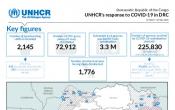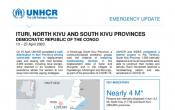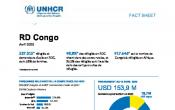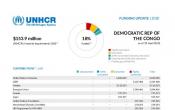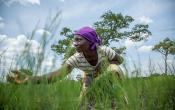Democratic Republic of the Congo
Operation: Democratic Republic of the Congo
Location
{"longitude":22,"latitude":-4,"zoom_level":5,"iso_codes":"'COD','GAB'"}
By clicking on the icons on the map, additional information is displayed.
The boundaries and names shown and the designations used on this map do not imply official endorsement or acceptance by the United Nations.
Key Figures
| 2020 planning figures | |
| 100% | of primary school-aged children will be enrolled in primary education |
| 100% | SGBV survivors (refugees) receive appropriate support. |
| 319,720 | people of concern will be registered on an individual basis |
| 33,200 | people of concern will receive shelter support |
| 2018 year-end results | |
| 100% | of refugee children under 12 months old issued birth certificates by the authorities |
| 80% | of Burundian refugee households live in adequate dwellings |
| 75% | of South Sudanese refugees were registered on an individual basis |
| 50% | of IDPs were reunited with family members with the assistance of UNHCR |
| 76,000 | Rwandan refugees were biometrically registered by the end of 2018, including some 35,420 who were registered during the year |
| 8,880 | refugee children from the CAR were enrolled in primary education |
Latest Updates and Related Links
People of Concern
52%
Increase in
2019
2019
| 2019 | 7,699,931 |
| 2018 | 5,059,095 |
| 2017 | 5,145,780 |

[["Refugees",524193],["Asylum-seekers",3275],["IDPs",5014253],["Returned IDPs",2134349],["Returned refugees",23861]]
Loading ...
Democratic Republic of the Congo
< Back
2019
{"categories":[2015,2016,2017,2018,2019,2020],"budget":[207.82899884,209.71033616,234.31289884,198.877860264,155.86684905,168.21985667],"expenditure":[81.24654248,73.23818483,88.617526,91.8951266,109.65337005,null]}
{"categories":[2015,2016,2017,2018,2019,2020],"p1":[91.41104086,103.12806996,136.71162641,107.81339627,97.47881999,100.68534792],"p2":[2.69677526,1.923405,1.94889796,1.28578031,1.056962,5.7872833],"p3":[38.54665211,29.81920304,29.873246,11.1438503,10.63418201,6.23349528],"p4":[75.17453061,74.83965816,65.77912847,78.634833384,46.69688505,55.51373017]}
{"categories":[2015,2016,2017,2018,2019,2020],"p1":[57.35459999,58.9382084,65.13414131,56.67529834,58.0796307,null],"p2":[0.72133408,0.36397887,0.48065037,0.40466331,0.26290483,null],"p3":[10.2698795,3.24760875,3.79706059,0.5195974,7.65277135,null],"p4":[12.90072891,10.68838881,19.20567373,34.29556755,43.65806317,null]}
Loading ...
CHOOSE A YEAR
- 2014
- 2015
- 2016
- 2017
- 2018
- 2019
- 2020
Year-end Overview
Working environment
The crisis in the Democratic Republic of the Congo is fuelled by ethnic and political conflicts. The already unstable security situation, particularly in the east of the country, is exacerbated by the electoral process, culminating in the presidential elections expected to be held on 23 December 2018. The risk of further displacement, sparked by inter-ethnic conflict, armed groups and civil unrest, in the lead up to the elections, and after the elections in 2019 remains high. These risks create a disastrous impact on the already precarious humanitarian situation in the DRC, and destabilising the Great Lakes region. The maintaining of humanitarian access and civilian character of asylum remains of concern for the coming year.UNHCR works closely with the Government, which maintains an open border and an out-of-camp policy for refugees. This is conducive to supporting UNHCR to move from a “care and maintenance” approach, focusing instead on durable solutions and self-reliance as a step towards the Comprehensive Refugee Response Framework and multi-year, multi-partner (MYMP) strategy for which consultations with the authorities have begun. UNHCR seeks to integrate refugees into national service delivery systems and frameworks, supporting both refugees and host communities, including through reinforcing partnerships with authorities, UN agencies, NGOs, and the private sector.
Key priorities
In 2019, UNHCR will focus on:- Ensuring a protective environment for people of concern while continuously emphasizing durable solutions, resilience and empowerment in order to gradually reduce assistance and dependency on humanitarian aid.
- Accentuating innovative approaches, enhancing cash assistance, strengthening livelihood opportunities and seeking new partners to ensure implementation.
- In accordance with the Refugee Coordination Model (RCM), continue to lead and coordinate efforts for refugees, while drawing on the support of other members of the Humanitarian Country Team.

